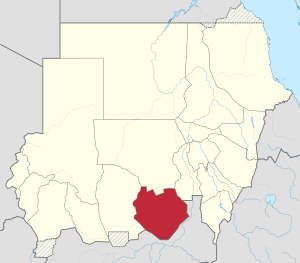Infrastructure tools to support an effective radiation oncology learning health system
Contents
South Kordofan
جنوب كردفان Ǧanūb Kurdufān | |
|---|---|
 | |
| Coordinates: 11°8′N 29°53′E / 11.133°N 29.883°E | |
| Country | |
| Region | Nuba Mountains |
| Capital | Kaduqli |
| Government | |
| • Governor | Adam Al-Faki Mohamed al-Tayeb |
| Area | |
• Total | 79,470 km2 (30,680 sq mi) |
| Population (2018) | |
• Total | 2,107,623[1] |
| Time zone | UTC+2 (CAT) |
| HDI (2017) | 0.431[2] low |
South Kordofan (Arabic: جنوب كردفان Ǧanūb Kurdufān) is one of the 18 wilayat or states of Sudan. It has an area of 158,355 km2[3] and an estimated population of approximately 2,107,623 people (2018 est).[4] Kaduqli is the capital of the state. It is centered on the Nuba Mountains. At one time it was supposed that South Kordofan was the only state in (North) Sudan suitable for producing oil, but oil has also been discovered in neighboring White Nile State in larger quantities.[5]
Under the Comprehensive Peace Agreement, residents of South Kordofan were to hold popular consultations in 2011 to determine the constitutional future of the state. However, South Kordofan governor Ahmed Haroun suspended the process and violence followed.[6] Haroun had previously been charged with war crimes against civilians and crime against humanity by the International Criminal Court.
History
Although South Kordofan is part of Sudan, it is home to many pro-South Sudan communities, especially in the Nuba Mountains, some of whom fought alongside southern rebels during the long civil war.[7]
In 2009 and 2010, a series of conflicts between rival nomadic tribes in South Kordofan caused a large number of casualties and displaced thousands.
On June 6, 2011, An armed conflict broke out between the forces of Northern and Southern Sudan, ahead of the scheduled independence of the South on July 9. This followed an agreement for both sides to withdraw from Abyei.[8][9] On June 20, the parties agreed to demilitarize the contested area of Abyei where Ethiopian peacekeepers were deployed.[10] Abyei is currently controlled by the United Nations Interim Security Force for Abyei.[11]
Districts of Southern Kordofan

- Dilling District
- Rashad District
- Abu Jubaiyah District
- Talodi District
- Kadugli District
- Al Qoz District
- Habila District
- Reif Ashargi District
- Heiban District
- Umm Dorein District
- Al Buram District
- El Abassiya District[12]
Cities and towns of Southern Kordofan
- Ed Dubeibat
- Kaduqli (capital)
See also
- Kordofan - overall region
- Eyes and Ears Of God – Video surveillance of Sudan - documentary film
- Nuba Mountains
- Languages of the Nuba Mountains
- Ghulfan people
References
- ^ "Archived copy" (PDF). Archived from the original (PDF) on 2017-03-12. Retrieved 2023-06-09.
{{cite web}}: CS1 maint: archived copy as title (link) - ^ "Sub-national HDI - Area Database - Global Data Lab". hdi.globaldatalab.org. Retrieved 2018-09-13.
- ^ Sources disagree on the size of the state. The government of Sudan lists the area as 970,470 km², Statoids as 158,355 and the International Crisis Group as ""about 120,000 sq. km"" (PDF). Archived from the original (PDF) on 2008-12-11. (1.19 MB) (p. 1)
- ^ "Archived copy" (PDF). Archived from the original (PDF) on 2017-03-12. Retrieved 2023-06-09.
{{cite web}}: CS1 maint: archived copy as title (link) - ^ Interview with Abdel Aziz Adam Al Hilu (commander of SPLA in Nuba mountains), 18 June 2011, by Tomo Križnar
- ^ Martell, Peter (2011-06-20). "BBC News - Is Sudan heading for an acrimonious divorce?". Bbc.co.uk. Retrieved 2014-02-10.
- ^ "BBC News - Sudan's South Kordofan: 'Huge suffering from bombs'". Bbc.co.uk. 2011-06-14. Retrieved 2014-02-10.
- ^ [1] Archived June 29, 2011, at the Wayback Machine
- ^ "BBC News - Sudan: Barack Obama calls for ceasefire". Bbc.co.uk. 2011-06-15. Retrieved 2014-02-10.
- ^ [2] Archived June 29, 2011, at the Wayback Machine
- ^ "Conflict in Abyei Could Reignite South Sudan's Civil War".
- ^ "Sudan: South Kordofan - Who Does What Where" (PDF).
External links


















